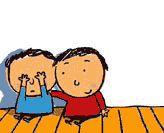
What
is child anxiety?
All humans experience anxiety, it serves as a means of protection and can
often enhance our performance in stressful situations. Children who are able
to experience the slight rush of anxiety that often occurs prior to a math
test or a big track race often can enhance their performance. However, experiencing
too much anxiety or general nervousness, at inappropriate times, can be extremely
distressing and interfering. Although children have fears of specific objects,
the feeling of anxiety is more general…children may feel constantly “keyed
up” or extremely alert. Given the wide range of tasks children must accomplish
throughout their childhood, it is important to be sure that their level of
anxiety does not begin to interfere with their ability to function. If it
does, it is important that they begin to learn some skills for coping more
efficiently with their anxious feelings.
What
are fears and phobias?
 Children’s
fears are often natural, and arise at specific times in their development.
Children may develop fears from a traumatic experience (e.g. traumatic
dog attack), but for some children, there is no clear event that causes
the fear to arise. Some children become fearful simply by watching another
child acting scared. Some children may refuse to sleep alone due to fears
of creatures in their closet, while other children report feeling afraid
of the dark. Children's fears are often associated with avoidance, discomfort,
and physical complaints, such as rapid heart beat, stomach distress, sweaty
palms, or trembling. Researchers have found certain fears arise at specific
ages in all children, and these fears tend to disappear naturally with
time, as the child grows older. When children’s fears persist beyond the
age when they are appropriate, and begin to interfere with their daily
functioning, they are called phobias. Typically, children who are experiencing
a phobia should be referred for treatment by a psychologist.
Children’s
fears are often natural, and arise at specific times in their development.
Children may develop fears from a traumatic experience (e.g. traumatic
dog attack), but for some children, there is no clear event that causes
the fear to arise. Some children become fearful simply by watching another
child acting scared. Some children may refuse to sleep alone due to fears
of creatures in their closet, while other children report feeling afraid
of the dark. Children's fears are often associated with avoidance, discomfort,
and physical complaints, such as rapid heart beat, stomach distress, sweaty
palms, or trembling. Researchers have found certain fears arise at specific
ages in all children, and these fears tend to disappear naturally with
time, as the child grows older. When children’s fears persist beyond the
age when they are appropriate, and begin to interfere with their daily
functioning, they are called phobias. Typically, children who are experiencing
a phobia should be referred for treatment by a psychologist.
Which
of my child’s fears are normal?
Most children, when asked, are able to report having several fears at any
given age. Some research shows that 90% of children between the ages of 2-14
have at least one specific fear. If your child’s fear is not interfering with
his/her daily life (e.g., sleep, school performance, social activities) ,
or your family’s life, then most likely you will not need to bring your child
to a psychologist for help. Here are a list of fears that are found to be
VERY COMMON for children at specific ages:
INFANTS/TODDLERS (ages 0-2 years) loud noises, strangers, separation from parents, large objects
PRESCHOOLERS (3-6 years) imaginary figures (e.g., ghosts, monsters, supernatural beings, the dark, noises, sleeping alone, thunder, floods)
SCHOOL AGED CHILDREN/ADOLESCENTS (7-16 years) more realistic fears (e.g., physical injury, health, school performance, death, thunderstorms, earthquakes, floods.
Copyright
© 2001 The Child Anxiety Network. All Rights Reserved.
Sponsored by Psychzone Inc.
Last
Updated
May 5, 2015

